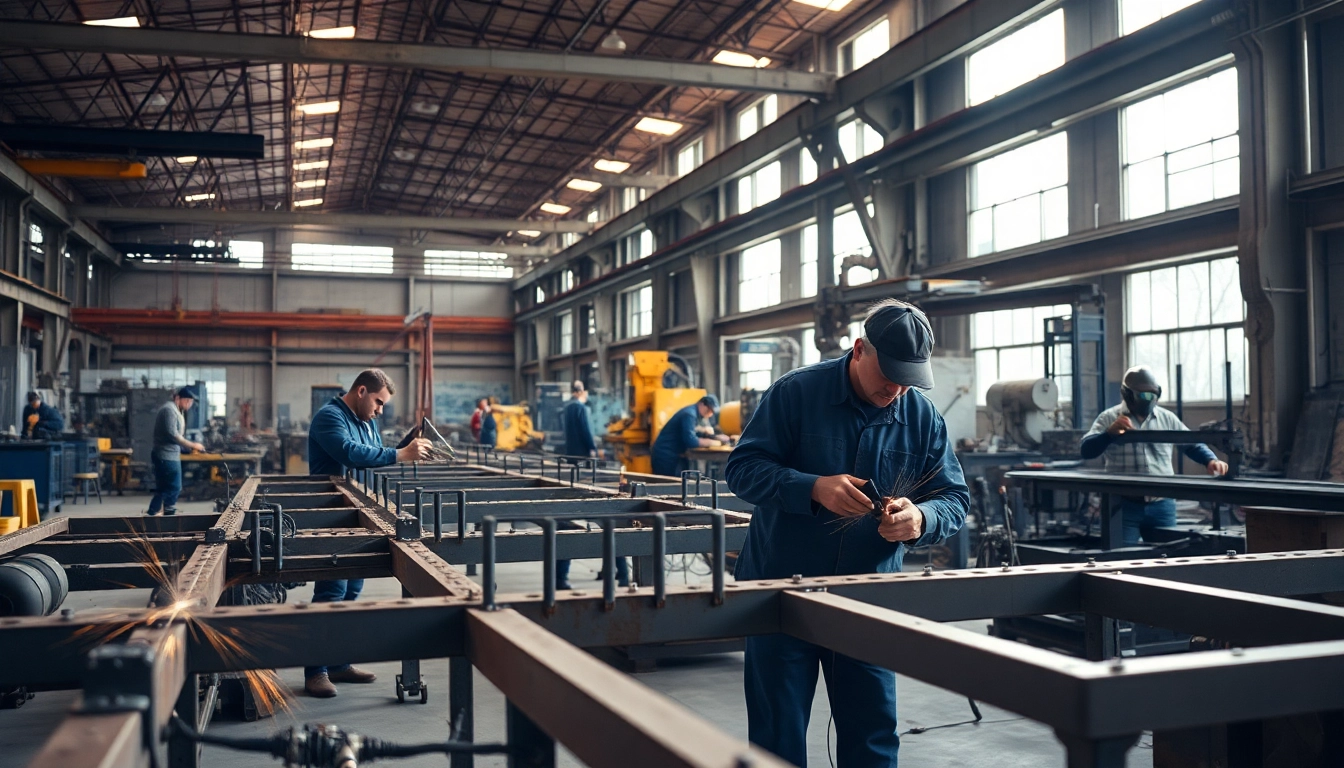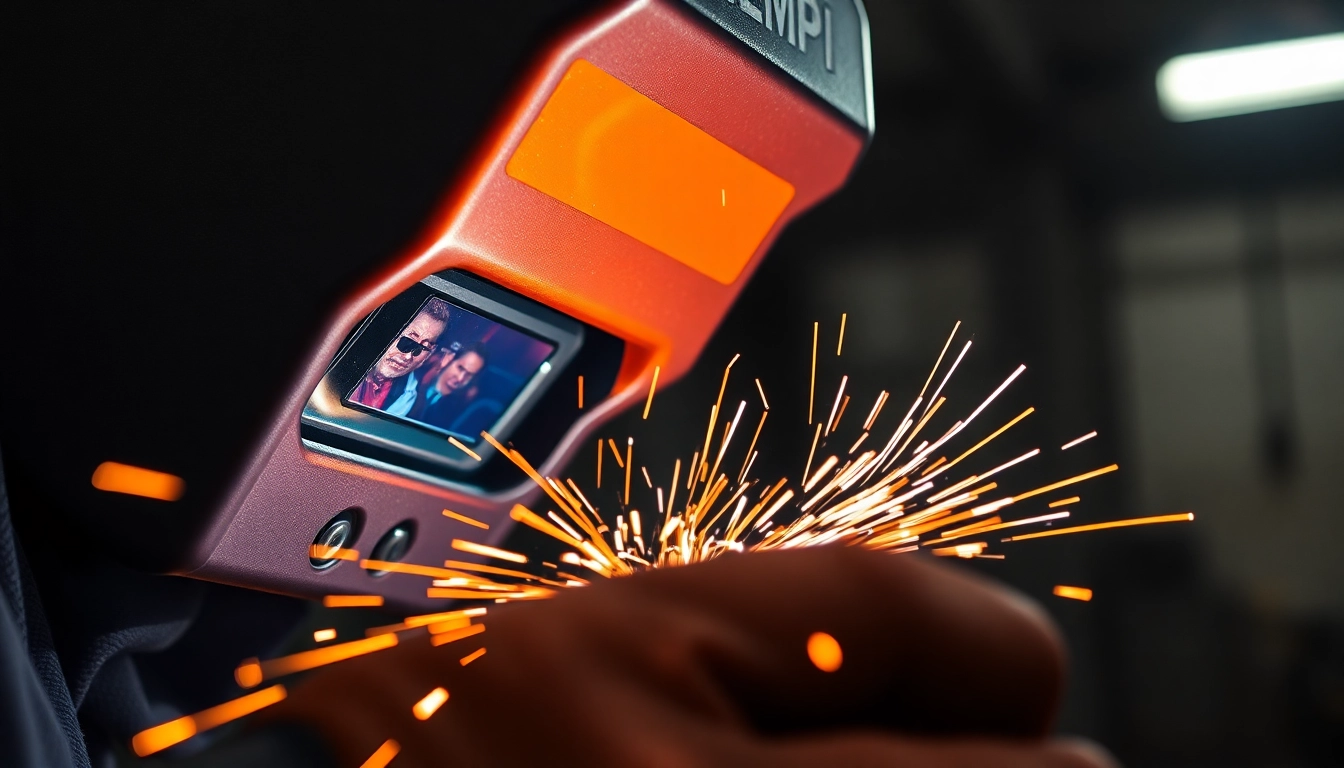Understanding Steel Fabrication
What is Steel Fabrication?
Steel fabrication is the process of transforming raw steel into various products and components tailored for specific applications. It encompasses cutting, bending, welding, and assembling steel plates, bars, beams, and other forms to create structures or parts essential in construction, manufacturing, and various industries. Skilled craftsmen and technicians utilize advanced tools and machinery, such as laser cutters and robotic welding machines, to ensure precision and quality, which are paramount in steel fabrication services.
This industrial process is critical in various sectors, including construction, automotive, aerospace, and shipbuilding, where durability and strength are vital. As technology evolves, the methods and techniques of steel fabrication continue to advance, incorporating automation and computer-aided design (CAD) to enhance efficiency and reduce waste.
The Importance of Steel Fabricators Near Me
Choosing the right steel fabricator is a crucial decision for anyone needing metal fabrication services. A local fabricator is often more accessible for consultations, site visits, and timely communication. Furthermore, engaging with steel fabricators near me can lead to benefits such as lower transportation costs and quicker turnaround times for projects. Local fabricators are generally more attuned to regional building codes and materials. They also have established relationships with other local suppliers, which can facilitate the procurement of additional materials needed for your projects.
Common Applications of Steel Fabrication
Steel fabrication serves a myriad of applications, demonstrating its versatility and importance. Here are some common uses:
- Construction: Steel is fundamental in building frameworks for commercial and residential structures, ensuring stability and safety.
- Automotive: The automotive industry relies heavily on steel parts for durability; frames, chassis, and engine components are often fabricated from high-grade steel.
- Aerospace: Light but strong steel alloys are fabricated for aircraft components, optimizing weight and strength ratios.
- Shipbuilding: Steel fabrication is essential in constructing the hull and other structural parts of ships, providing resistance against harsh marine environments.
- Industrial Machinery: Numerous manufacturing machines and equipment rely on fabricated steel components for functionality and longevity.
Choosing the Right Steel Fabricators Near Me
Factors to Consider When Selecting Fabricators
Selecting the right steel fabricator involves careful evaluation of several factors to ensure you receive quality services. When considering steel fabricators near me, here are essential criteria to evaluate:
- Expertise and Experience: Assess how long the fabricator has been in the industry and their areas of specialization. Experienced fabricators are better equipped to handle complex projects.
- Certifications: Look for certifications such as ISO for quality management, AWS for welding, and other relevant industry standards, as they reflect a commitment to quality.
- Portfolio: Review previous work to gauge the type and quality of projects they have completed.
- Technology Utilization: A fabricator using advanced machinery and technology is often more efficient and able to produce precise results.
- Customer Service: Good communication is vital. The right fabricator will be responsive to your inquiries and keep you informed throughout the fabrication process.
Comparing Services and Capabilities
When you research steel fabricators near me, create a comparative analysis of the services offered. Some fabricators may specialize in certain types of materials, such as stainless steel or aluminum, while others may offer unique processes like laser cutting or 3D fabrication. Additionally, consider the scope of services:
- Custom Fabrication: Check if they can tailor solutions based on your specific requirements.
- Prototype Development: Some fabricators specialize in creating prototypes, which can be particularly useful for businesses testing new products.
- Assembly Services: Some fabricators offer assembly and installation options, which can save time and reduce the project’s complexity.
Reading Customer Reviews and Testimonials
Customer feedback is an invaluable resource when assessing potential fabricators. Look for testimonials on their websites, social media platforms, and independent review sites. Positive reviews can indicate reliability, quality of work, and customer service excellence. Pay attention to patterns in feedback, especially regarding deadlines and the quality of completed work. Don’t hesitate to ask potential fabricators for references that you can contact directly.
Establishing a Successful Partnership
Effective Communication with Your Fabricator
Once you select a steel fabricator, clear communication is essential for a successful partnership. Establish preferred methods of communication early on, and ensure that the fabricator understands your project goals and deadlines. Consider using shared project management tools that allow both parties to track progress and resolve any issues quickly.
Setting Project Milestones and Expectations
Work with your fabricator to set realistic milestones and deadlines. Setting expectations will help you monitor the project effectively and keep it on track. Include important phases such as design approval, material procurement, fabrication, and final inspection. Having a timeline will aid in managing budgets and identify potential delays early.
Ensuring Quality Control Throughout the Process
Quality control is a critical aspect of the fabrication process that cannot be ignored. Establish protocols for inspections at various stages of the project. This might include checking material integrity upon delivery, reviewing measurements during fabrication, and conducting final inspections before project handover. This proactive approach can mitigate issues before they escalate into costly rework.
Cost Considerations in Steel Fabrication
Understanding Pricing Models
Cost in steel fabrication can vary widely based on several factors, including material costs, labor, equipment usage, and the complexity of the project. Generally, fabricators may use pricing models such as:
- Fixed Pricing: A set price based on the project scope and specifications.
- Cost-Plus Pricing: The manufacturer charges for the cost of materials and labor plus a markup for profit.
- Time and Materials Pricing: Costs are charged based on the actual time spent and materials used during the fabrication process, which may be useful for open-ended projects.
Budgeting for Different Fabrication Services
Establishing a budget ahead of time will help guide your choices and keep costs in line throughout the project. Factor in not only the immediate fabrication costs but also any ancillary expenses, such as transportation, installation, or post-delivery service. Itemizing these elements will allow for clearer communication with your fabricator and ensure realistic expectations are set.
Finding Value Without Compromising Quality
While it can be tempting to choose fabricators based solely on cost, prioritize value instead of price. Seek a balance between competitive pricing and quality craftsmanship. Often, what appears to be a low-cost service may lead to higher costs down the line due to subpar materials or workmanship. Look for fabricators that offer warranties or guarantees on their work, as this often indicates confidence in their quality standards.
Future of Steel Fabrication
Emerging Technologies in Steel Fabrication
The steel fabrication industry is undergoing transformative changes due to advancements in technology. Innovations such as robotics, automation, and artificial intelligence (AI) are enhancing efficiency and precision. Laser cutting and 3D printing technologies are revolutionizing production capabilities, allowing for quicker prototyping and custom solutions tailored to unique project needs. The integration of smart technologies allows for real-time monitoring and feedback, which can streamline operations and enhance quality control.
Sustainability Trends in the Industry
Sustainability is emerging as a significant focus in steel fabrication. Companies are increasingly adopting eco-friendly practices, such as recycling scrap metal and utilizing energy-efficient machinery. More frequently, steel is being sourced sustainably and fabricated in ways that minimize environmental impact. By prioritizing sustainable practices, fabricators not only enhance their marketability but also contribute positively to global environmental efforts.
Preparing for Industry Changes and Advancements
As the steel fabrication landscape evolves, staying informed about new trends and technologies is essential for both businesses and consumers. Regularly assessing your fabricator’s capabilities and certifications can ensure they keep up with industry standards and innovations. Attending industry conferences and training sessions can provide valuable insights and networking opportunities, enabling you to make informed decisions about your projects.



